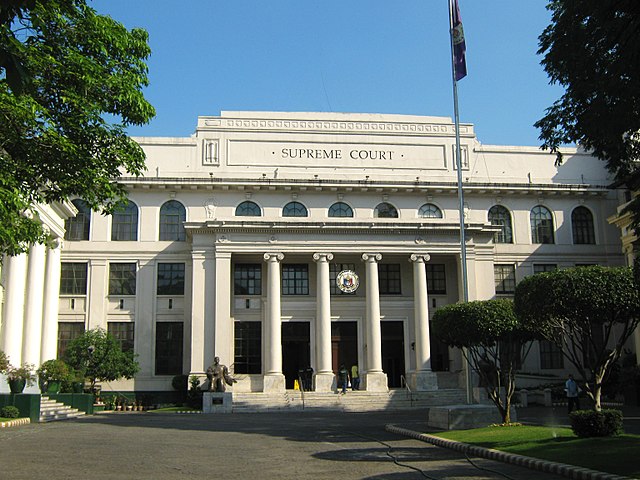News
SC sets tighter rules on TROs, judges’ recusal from hearings

In Administrative Order No. 63-2020 dated February 20, Peralta required justices and judges to submit to his office copies of the TROs, SQAs, and WPIs they issued within five days from such issuance beginning March 1. (File Photo By Mike Gonzalez (TheCoffee) – Own work, CC BY-SA 3.0)
MANILA — The Supreme Court (SC) on Friday ordered the implementation of tighter rules on the issuance of restraining orders and the withdrawal of judges from court proceedings.
In two separate orders, Chief Justice Diosdado Peralta has required all justices of the Court of Appeals (CA), Sandiganbayan, and Court of Tax Appeals (CTA), as well as trial court judges, to submit to the Office of the Chief Justice (OCJ) copies of temporary restraining orders (TROs), status quo ante orders (SQAs), and writs of preliminary injunction (WPIs), and orders of voluntary inhibition which they have issued.
In Administrative Order No. 63-2020 dated February 20, Peralta required justices and judges to submit to his office copies of the TROs, SQAs, and WPIs they issued within five days from such issuance beginning March 1.
The submission of reports on TROs and WPIs was earlier discontinued because these were already incorporated in a monthly report of cases.
These monthly reports, however, do not reflect the qualitative details of the TROs and WPIs.
Judges and justices are also required to copy furnish the Office of the Court Administrator (OCA) all TROs, SQAs, and WPIs they issued. The copies may either be e-mailed or sent through postal mail addressed to the OCJ.
Peralta said “[i]njunction is an extraordinary remedy to be resorted to when there is a pressing necessity to avoid injurious consequences that cannot be remedied under any standard compensation. A court may issue an injunction only if it is fully convinced of its extreme necessity and after it has complied with the procedural requirements set by law.”
Citing precedents, Peralta said “every court should remember that an injunction should not be granted lightly or precipitately because it is a limitation upon the freedom of the defendant’s action” and “should be granted only when the court is fully satisfied that the law permits it and the emergency demands it, for no power exists whose exercise is more delicate, which requires greater caution and deliberation or is more dangerous in a doubtful case, than the issuance of an injunction.”
Meanwhile, Administrative Order No. 62-2020 requires magistrates of the third-level courts and the second-and first-level court judges to specifically address “persistent reports that some justices and judges have been voluntarily inhibiting from cases assigned or raffled to them on grounds that are neither just nor valid.”
Peralta reminded those concerned of their duties “to perform their judicial duties without favor, bias or prejudice” as mandated by Section 1, Canon 3 of the New Code of Judicial Conduct for the Philippine Judiciary and to “carry out judicial duties with appropriate consideration for all persons, such as the parties, witnesses, lawyers, court staff and judicial colleagues, without differentiation on any irrelevant ground, immaterial to the proper performance of such duties under Section 3, Canon 5 of the same Code.
All copies of orders of voluntary inhibition should be submitted to the OCJ, copy furnished the OCA, within five days from the issuance of such orders.





















